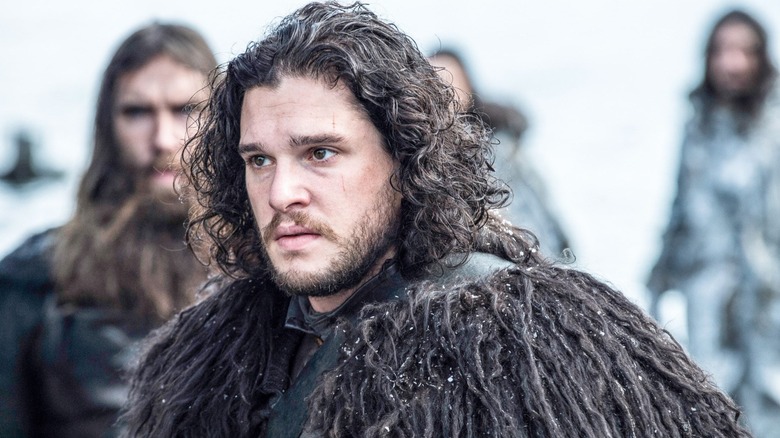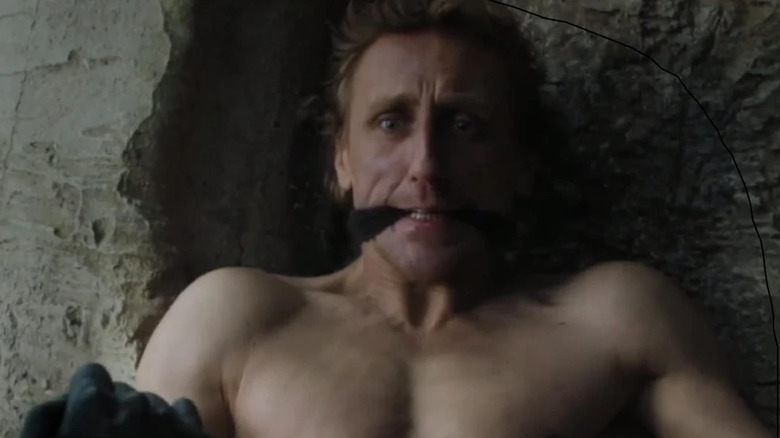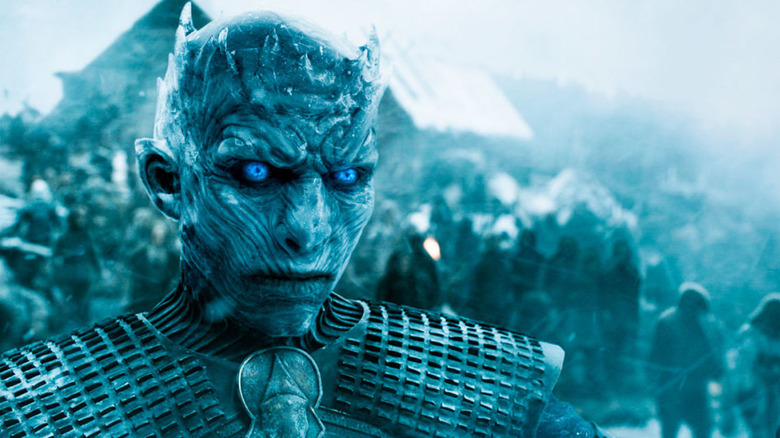One Game Of Thrones Actor Was Recast And Fans Totally Missed It
"Game of Thrones" had its share of recastings — they were inevitable with a production and an ensemble as sprawling as the show had. The series had two Daario Naharises (Ed Skrein and then Michiel Huisman) and three Gregor Cleganes (Conan Stevens, Ian Whyte, and finally Hafþór Júlíus Björnsson). After season 2, "Game of Thrones" also recast both of the younger Lannister-Baratheon siblings, Myrcella (Aimée Richardson and then future "First Omen" star Nell Tiger Free) and King Tommen (Callum Wharry and Dean Charles Chapman). Even Daenerys Targaryen was played by Tamzin Merchant, not Emilia Clarke, in the unaired (and then remade) "Game of Thrones" pilot.
One "Game of Thrones" recasting might have slipped your notice, though, because both successive actors were buried beneath make-up. That recasting would be the Night King, leader of the undead White Walkers. In seasons 4 and 5, the Night King was played by Welsh actor Richard Brake; you might recognize him as Joe Chill (murderer of Bruce Wayne's parents) from "Batman Begins," or his later role as the evil Frank in the 2022 horror film "Barbarian."
But Brake's schedule meant he couldn't return for season 6. Specifically, he had a recurring part on Kurt Sutter's historical drama "The Bastard Executioner." That show, set in 14th century Wales, seemed very much like it was trying to ride the "Game of Thrones" wave, but was swiftly canceled. Brake is fine with how it turned out, though, feeling he would've lost other opportunities had he been bound to "Game of Thrones." Plus, he's part of the small "Game of Thrones" season 8 fan-club (him and Peter Dinklage). As he told Consequence in 2019:
"I did watch the end of the season. I didn't know ahead of time what was gonna happen, but I love the way my character ended up dying because Arya was always my favorite. I wasn't surprised. I thought it was a brilliant development, actually."
The Night King killed by Arya Stark in season 8's "The Long Night" was played by stuntman Vladimir Furdik. Rather than the ethereal Others of George R. R. Martin's "A Song of Ice And Fire" books, "Game of Thrones" changed their White Walkers into hideous ice zombies. The Night King was no exception, but his bald head had horns in the shape of a crown, instead of flowing white hair like his generals. Brake and Furdik aren't exactly twins, but the consistent make-up design meant the differences are small enough to overlook.
The Night King embodies Game of Thrones' later troubles
The recasting meant that Furdik also got to play the Night King's human self in season 6's "The Door." This is the episode where Greenseer Bran Stark (Isaac Hempstead Wright) looks across history to the time of Westeros' First Men and discovers the origin of the White Walkers.
All those centuries ago, the First Men warred with Westeros' original inhabitants: wood nymphs called the Children of the Forest. Legends say the Men and Children united to defeat the White Walkers after the Long Night swept across the land, but the truth is not so simple; the Children created the White Walkers to destroy humanity, but lost control of their undead knights. Furdik's character is a First Man captured by the Children, bound before a mystical Weirwood Tree; when the Children plunge a dagger of dragonglass into his heart, his eyes turn blue and the sound of ice cracking can be heard.
And that's it; that is the extent to which "Game of Thrones" fleshed out the White Walkers, the Night King, and their history. No disrespect intended to Furdik, but I think it's pretty telling that the Night King was recast with a literal stuntman; he was never a character, merely an obstacle. There is no counterpart to him in Martin's books, for he is an archetypal "Dark Lord," which Martin has called an overused trope of Tolkien wannabes.
When the Night King debuted in "Game of Thrones" season 4, he was initially assumed to be the Night's King, the historical 13th commander of the Night's Watch (and possible Stark ancestor). Legend says the Night's King was seduced by a female White Walker and killed for betraying the race of men to the dead. (Martin's work is filled with in-universe legends to make Westeros feel more alive.) That was not the case, but I kind of wish it had been; then there could be something to grab onto. As it is, the Night King has gone down as one of the many "Game of Thrones" characters the fans have claimed "deserved better."
Does George R. R. Martin know what to do with the White Walkers?
"Game of Thrones" creators David Benioff and D.B. Weiss have admitted they downplayed the story's magical side, fearful of alienating viewers who came to "Game of Thrones" because it was a real drama, not a fantasy. Some have pinpointed this attitude as reflecting the bare minimum detail given to the White Walkers, the creation of the Night King as a singular big bad to overcome, and the army of the dead's swift defeat with another cliche: kill the leader and all the drones keel over, "Phantom Menace" style.
While it's easy to blame Benioff and Weiss, I have to ask: does even George R. R. Martin know how to finish the White Walkers' story? The "Song of Ice and Fire" books remain infamously incomplete. "The Winds of Winter" still hasn't blown into bookstores 13 years and counting since "A Dance With Dragons."
The Others (the more common name in the books for the White Walkers) debut in the prologue to "A Game of Thrones," cornering and killing three men of the Night's Watch in an icy forest. Making this scene the very first chapter, and the repeated reminder in the first book that winter is coming, suggests the Others are the pivotal threat; they're expanding south once more and humanity better watch out.
Five books and 3000+ pages later, the Others have appeared across maybe three dozen pages and almost nothing has been revealed. What knowledge there is comes from the POV characters' observations of them. Unlike the silent White Walkers, the Others have a language, but one that's incomprehensible to humans (their words sound like crackling ice). Their armor is made of ice and reflects light, thus the Others have a constantly shifting appearance based on their surroundings. They can be killed by obsidian/dragonglass and, perhaps, Valyrian steel.
If Martin has an origin for the Others, I'd say it's probably the show one. There's been some clear hints that the Others are transformed humans; the wildling Craster trades his newborn sons to them for safety, and the show explicitly says this is so the Night King can make the babies into new White Walkers. Plus, with how little the Children of the Forest factor into "Game of Thrones," I can't imagine Benioff and Weiss giving them such a pivotal role in the series' mythology unless they heard it from Martin's mouth.
But even if Martin does have a beginning figured out for the Others, he doesn't seem to have an ending. I think it's plausible that he hasn't even figured out how to avoid the pitfalls the show fell into: how to keep the Others inhuman but not just ice Orcs, how to avoid a "heroes team up to fight the big bad" ending, etc.
The Night King has no clothes, for neither Martin nor Benioff & Weiss were able to knit the proper suit for these winds of winter.


